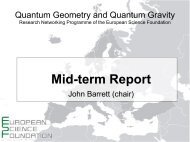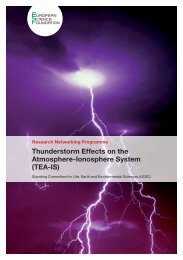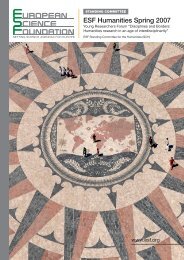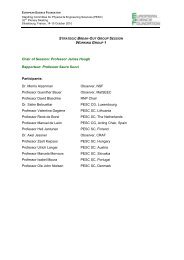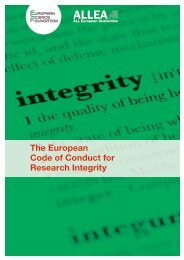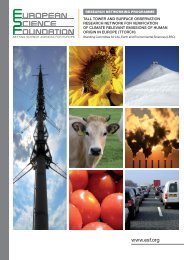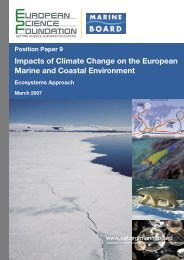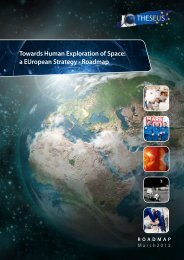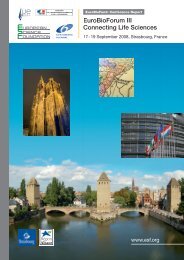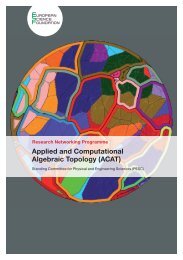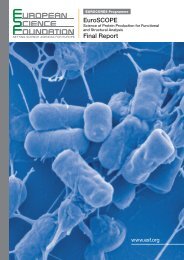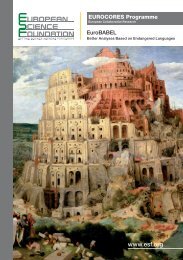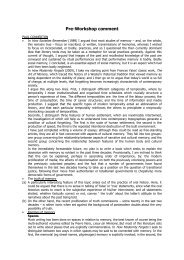30Responses to Environmental and Societal Challenges for our Unstable Earth (RESCUE)government intervention with regards to subsidies,investments, direct regulation and tax policy. Thusdata from focus groups, surveys, observations ofindividual and household behaviour obtained inan open knowledge system are gathered to supportsuch policies. An open knowledge system is closelyconnected to issues of freedom of information andintellectual property rights and relies in particularon freely accessible data.Building capacity for an openknowledge systemSustainability cannot be imposed. It can only belearned and it can only develop effectively when alarge proportion of the human population changesits behavioural patterns to more sustainable practices.The vision of an open knowledge systemprovides a vast process of sustainability and sociallearning (e.g., Scholz et al., 2006; Tàbara & Pahl-Wostl, 2007; Stibbe, 2009; Scholz, 2011; see alsoAnnex 4) to empower individuals and groups fromall sectors of society, not just the scientific community,to tackle the urgent problems of acceleratedglobal change. Learning to do new things, do themin different ways, and producing different types ofknowledge forms for diverse purposes are stimulatedin the clusters of the open knowledge system.Fundamental to a vision of future knowledge andlearning is the recognition that change is occurringover temporal and spatial scales that requirecontinual change in societies now and far into thefuture. Consequently, learning to learn and adaptivethinking are the goals of the trajectory of learningthrough everyone’s lifetime. Furthermore, for theRESCUE Vision to be achieved, much more attentionis needed regarding the questions of what educationmeans in an open knowledge system and what placeknowledge bases and repositories and methodologicalanalyses (e.g., Singh et al., 2009) have in such asystem.Five potential foci of the revolution in educationand capacity building that is part of the RESCUEVision have been elaborated.a.Building capacity to do the interdisciplinary andsystems research required to understand and managethe challenges of an unstable EarthThe framework for interdisciplinary and transdisciplinaryresearch discussed above requires anincreased commitment in the RESCUE Vision tothe development of interdisciplinary educationand curricula and accreditation criteria.b.A transformation of the university education systemthat trains potential researchers and educates citizensabout resilience and sustainabilityIn the RESCUE Vision institutions of higher educationsupport education that has comprehensiveintegrity. This involves teaching different stories,including stories that enable students to interactmore creatively with the emergent processes ofthe universe, providing not only the understandingand sense of direction for sustainability, butalso evoking the energy needed to create this newsituation (O’Sullivan, 2004). Efforts to promotehigher-order thinking and ‘resilience thinking’through problem-oriented teaching methods(Fazey, 2010; Walker and Salt, 2006) are also apriority.c. Creating awareness of sustainability in the primaryand secondary education systemsThe RESCUE Vision calls for an ambitious programmefor inquiry-based science education,whereby students (ages 5 to 16) are “encouraged todevelop a sense of wonder, observation, and logicalreasoning” (Léna, 2009).d.Capacity building and education of researchers indeveloping countriesThe RESCUE Vision responds to the need for theEU and national agencies “to develop multilateralefforts to aid capacity building in the developingworld, including the support of young researchers”(ESF, 2002, p.7). Developing countries are a‘special target audience’ because (i) the primaryintegrated societal challenge is that of livelihoodsand development, and (ii) institutions in developingcountries could be easily guided towardtransdisciplinary approaches to knowledge production.This allows the developing countries todevelop an endogenous narrative and agenda onwhat is needed for capacity building.e. Education of the public at large and the politiciansEducation is a key element in any response toenvironmental change (Qvortrup, 2009). TheRESCUE Vision thus encompasses adult educationand lifelong learning, as well as the promotionof transdisciplinary thinking and learningabout responsibility (Kegan and Lahey, 2009;Esbjörn-Hargens et al., 2010). Such initiatives areimportant for the development and maintenanceof the clusters of the open knowledge system withbroad participation of all layers and sectors ofsociety. This will also contribute to the deliveryof long-term political and societal agendas forsecuring transitions toward sustainability.
4.Achieving the RESCUE Visionl l lThe RESCUE Vision for an innovative, open knowledgesystem for the Anthropocene requires deepchanges in mind-sets, as well as in the cultural andmoral assumptions about what knowledge is, how itis produced, for whom it is, and for what goals. Thisalso requires profound changes in basic dominantattitudes and institutions and the inclusion of otherlegitimate sources of knowledge in truly global and,simultaneously, local or place-oriented dialogues forsustainability.The skills and abilities of scientistsThe skill-base of many academics and practitionersis not fit to fulfil the RESCUE Vision. In additionto the disciplinary specialisation discussedabove, many scientists have a very superficial andincomplete understanding of real-world politics,commerce and socio-economics. Linked to this, scientifictraining and weaknesses in political cultureleave people disinclined and not used to reflectingon their own activities, values and ethics. For theRESCUE Vision to become a reality, the researchcommunity must recognise and accept its socialresponsibility, and acknowledge the political natureof dealing with global change.In terms of required competences, scientificand methodological excellence is important forresearchers, but additional capabilities are neededfor achieving the RESCUE Vision. For example:• humility and openness towards other systems ofthought (other disciplines and cultures), worldviewsand other sources of knowledge, both formaland informal;• the ability to listen to others, being able to communicatein real (multiple-way) dialogues;• willingness to acknowledge that the partial knowledgethe researcher brings to the dialogue tablewill be transformed in the discussion process (givinglatitude to other people);• being focused on creating connections;• procedural and management skills;• the enthusiasm and ability to learn, rather thanimpose knowledge;• avoiding dualisms in the way social-ecological-technicalsystems are understood, e.g., byappreciating the knowledge embedded in livingorganisms and their intrinsic value, as a necessarycondition for improving the quality of the knowledgeon and for sustainability;• promoting integration between knowledge andpractice and integration of science and humanitiesand enhancing learning by doing and theexchange of experiences and practices, withinthis new vision of knowledge systems of openknowledge (social-ecological-technical/extended)democracy.• supporting the empowerment of people, especiallythose most exposed to local and global environmentalchanges, through collaborative andsustainability learning.Communication and collaboration skills are neededas part of the educational experience from earliestchildhood through university level, as well as adaptivethinking skills and the ability, disposition andcapacities for engaging with and enjoying complexand socially relevant issues; the skills and know-howto work in partnership across diverse governancesettings, with training that not only includes methodologiesand approaches, but also personal skillssuch as negotiation, communication and integrativeresearch methods and practices. See Winowiecki et31Responses to Environmental and Societal Challenges for our Unstable Earth (RESCUE)



